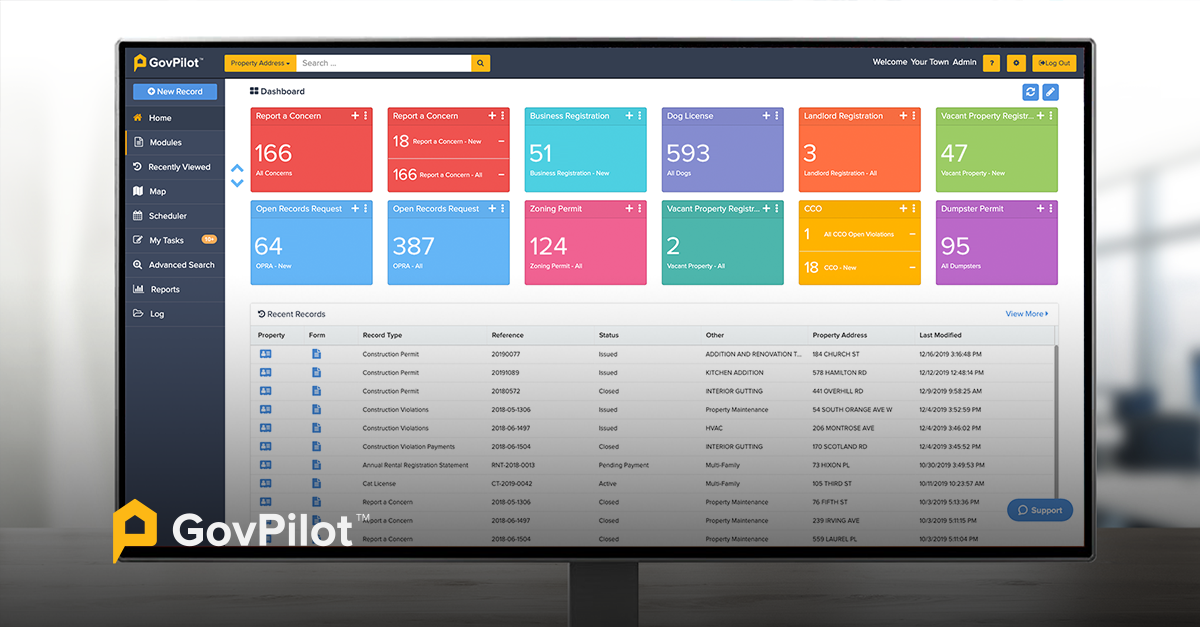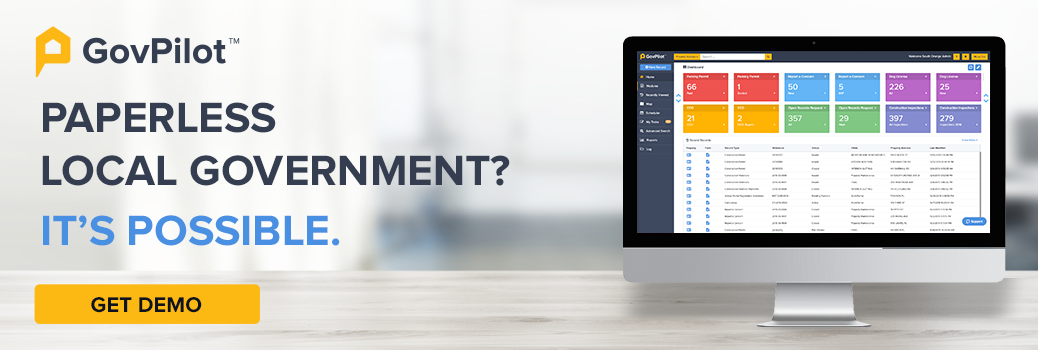Every local government has a lot on its plate when it comes to the sheer volume of paperwork being filed and stored. With decades worth of paperwork across departments, the regular filing of new documentation, and open records requirements for all public sector documentation to be readily accessible to the public, your local government needs to have good workflows in place for the processing and storage of public records.
Yet, for local governments using antiquated systems for public record management such as paper-based filing or single-use software, you're likely wasting countless hours manually keeping records organized and tracking down particular documents from file cabinets when needed.
Public record technology is your safest bet for streamlining document storage, uploading of new records, and handling open record request management. Read on to learn more about the key benefits and how to make the switch to digital record management.
What is Public Records Technology?
Public record technology is government software that fully digitizes public records in the cloud. The technology regularly backs up data to ensure permanent access to crucial local government documentation.
When onboarding public record software, existing data sets including inspection forms, work orders, and prominent application types like open record request, permit and licensing applications can be carried over into your new platform. Beyond the onboarding process, public applications and forms will be filled out and filed in a virtual format.
What are the Benefits for Local Governments Using Public Records Software?
Moving to the cloud to store your local government data and documentation comes with countless benefits.
Here are some of the major benefits of making a government digital transformation for public record storage:
1. Simplified uploading of all existing records to the government cloud:
When you onboard GovPilot, onboarding specialists will assist in uploading all of your existing records that are stored in either on-site systems or filing cabinets to the cybersecure government platform powered by Microsoft Azure. From then forward, all government records (both new and existing) will be accessible to government officials in a few clicks.
Consider how public health data management can help your local government to collect and break down health department data to streamline workflows.
2. Regular data backups:
Governments are increasingly at risk of losing their data with increasing ransomware attacks, other types of data breaches targeting local governments, and natural disasters. Now, even if a breach, storm, or other emergency occurs, all of your government data will be secure and remain accessible to your locality.
3. Easy open record request management:
Citizens can apply for court record requests and other open record request types directly from your government website. Popular document types can be automatically emailed to citizens, and for more specific requests, government officials can find the document and submit it virtually in moments. Fees can be collected via a credit card integration for each request.
Learn more about Modern Government Fee & Fine Processing.
4. Cybersecurity:
Local governments have become hot targets for hackers due to their antiquated technology like on-site servers and easy susceptibility to phishing scams and other hacking tactics many government officials aren’t trained on. GovPilot is operating on the Microsoft Government Cloud and recommends government cybersecurity training as a part of onboarding to ensure your local government is secure.
5. Data security with natural disasters and emergencies:
If you’re still using physical servers or paper-based filing, your local government can lose millions of important documents to a flood, fire, tornado, landslide, or other threatening climate disaster in your area. Using the cloud ensures that critical data won’t be lost and can be accessed from a remote location in the wake of a disaster. Learn more about mitigating natural disasters:
- Local Government Disaster Management Strategy
- Local Government Flooding Mitigation Strategy
- Local Government Wildfire Mitigation Strategy
- Local Government Landslide Mitigation Strategy
- Local Government Tornado Mitigation Strategy
- Building Disaster Resilient Infrastructure at the Local Level
6. GIS maps for property records
Every government document pertaining to a specific residential or commercial property within your jurisdiction will be accessible to government officials via GIS mapping technology. The full set of permit and licensing records, building and health inspection reports, etc. associated with a property in your community will be accessible to government workers in moments.
Learn more about the Benefits of GIS Mapping for Local Governments.
How Else Does Going Digital Impact Local Governance?
Beyond the immediate benefits to automatically storing public records in the cloud, your local government will transform its workflows and strategic planning with:
-
Real time data collection
With online forms across government departments, applications and related documentation will be stored and accessible to all relevant government officials within seconds. With instant access to every public worker involved in approving things like online permit applications, license applications, and open record requests, citizens will virtually get approval or denial notifications at a significantly speedier pace.
Bexar County, Texas reported decreasing their permitting backlog by 84% by digitizing their inspections and processing workflows. Learn more in the Bexar County case study.
-
Intuitive dashboard and reports
Using insightful data is critical to making smart decisions as a municipal planner or other government leader. Real-time data updates will be automatically pulled into intuitive dashboards highlighting various government KPIs like:
- Budget allocation: how much is being spent per department and where
- Fee & fine collection: where is revenue being generated? What types of applications and public record requests are being submitted
- Citizen complaints: which issues are constituents reporting in your concern management platform
- Project timelines: how long are infrastructure projects taking to get completed? Are private-sector partners hitting their deliverables?
- Government employee retention: how long are roles staying open? Are government workers sticking around long term?
- Citizen services: who needs more assistance in your community when it comes to access of government services? Veterans and other vulnerable communities can be assisted with ease.
Learn more about How to Master Local Government Analytics.
-
Mobile app for government field work
Whenever government officials are performing inspections for health inspections or physical infrastructure inspections, enforcing local ordinances in the field, the government inspection and code enforcement cell phone applications are web based, allowing reports to be filed and added to the cloud straight from a mobile field device.
Learn more about Mastering Government Building Inspections and Modern Local Government Code Enforcement Strategies & Technology.
-
Money and time saved
Government software is designed to automate tedious government tasks (using robotic process automation technology) that previously were handled manually by administrative public workers. The automation of these government workflows will save countless hours across departments, allows online government payment processing, money spent on man hours and giving government workers the opportunity to allocate their time on more important tasks that involve critical thinking.
Modern government technology is a major selling point for recruiting innovative government workers. Learn more about Using Local Government Benefits to Attract Workers and other Municipal HR Strategies.
Consider how crafting a Local Government Cyber Security Management Plan like New York City recently did to save time and resources staying cyber secure and automating processes like supply chain management can do for your municipality.
Store Your Government Records Digitally
Don’t spend another second thumbing through cabinets filled with disorganized paperwork. With digital public record management, your entire government staff will have access to relevant files within a matter of clicks.
In choosing to go digital, onboarding support will assist in uploading and organizing your physical records across departments to the GovPilot's cloud-based platform. From then on, all existing paperwork like permits & license applications, work orders, inspection records, property records, and beyond will be accessible in moments.
To learn more about how GovPilot can transform your local government, book a free demo.
Cloud-Based Public Records FAQs
What is Public Record Management?
Public record management is the process of filing and organizing local government paperwork. In addition to government data storage, your local government needs to have all government records easily accessible, as required by open record laws at the federal and state levels.
The three options a local government has for storage of public records are:
- Paper-based filing (the most traditional and antiquated method. Records need to be manually tracked down on a case by case basis.)
- On-site servers (storage of paperwork on physical computer systems set up by your government IT department. This approach is more secure than paper filing but requires government officials to be in-person to access public records)
- Government cloud (paperwork is stored using cloud technology, keeping your government data secure and accessible from government computer systems in-person or remotely)
What is Public Record Management Software?
Public records management software is cloud-based government technology for digitally storing and accessing all local government records.
The benefits of the technology include accessibility to all public records in just a few clicks, regular data backups to ensure data security, remote access to documents from government laptops and cell phones, and simplified online workflows for citizen applications. Public record management software has benefits for every government department such as the local health department where HIPPA standards can be ensured and protected.
Why is Paper-Based Filing Ineffective for Modern Governance?
Paper-based filing results in disorganized record storage, inefficiency in tracking down government records, and no data security. That means if a flood, fire, or other type of emergency occurs and your municipal buildings are impacted, the result could be the permanent loss of critical government data and records.
With the cloud, data is backed up constantly, ensuring that even in the wake of a natural disaster (or government cybersecurity breach) your government will continue to have access to all government documentation.
Why is the Government Cloud Better Than On-Site Servers for Local Governments?
While on-site servers are better than paper-based workflows, these systems are still susceptible to data breaches, can be destroyed by a natural disaster or emergency, and require government employees to be in-person to access critical records.
With the cloud, data is secure and permanently backed up, and can be accessed from a remote location. Learn more about the advantages to the Cloud vs. On-Site Servers.
How Does Going Digital Work With Existing Government Records?
Your local government may be hesitant to make the switch online because of your decades worth of physical records being stored in filing cabinets. Luckily, the transition to the cloud is easier than you might imagine. When you choose GovPilot as your local government digital transformation partner, a team of onboarding specialists will assist in moving physical assets across every government agency to the cloud. Moving forward, all applications and documents will be submitted and stored online.
Read on for the latest local government trends:










